Farewell, Oscar the Dog
Our dog Oscar died this week.
It’s a weird thing to hear myself say, because it’s true, and the truth of it is a thing that feels surreal after him being a constant part of our lives for almost 13 years. I’m not much of an animal lover, but in a very real, very nature-is-funny kind of way, Oscar treated me like I was his master. I always assumed that it was some instinctual sense that I was the alpha of the pack, being the biggest and the loudest as I am. He had a special sort of deference to me, even though I was often cranky with him for barking like a maniac at everyone who got near the house or chasing cars or shredding poopy baby diapers under my bed or always managing to get underfoot and trip me while I was carrying something. Later, as he got older and less capable, he would whine on the hardwood stairs after I was in bed, even though he’d made it 99% of the way up, because he was afraid he was going to slip and fall. Or he’d growl at me every time I walked into the kitchen, as though I somehow knew what that meant, even though nothing I did ever seemed to be the thing he was asking for. And I’d cuss him out for being so annoying and my wife would scold me for being a jerk (she was right) and he’d still be right back at my feet the next time I went to my desk like we were the best of friends.
He came into our lives in the summer of 2010 after our oldest daughter pleaded with us for years for a puppy, only to have the one she originally picked out of her grandfather’s junkyard dog litter die very early after getting sick with Parvo. My wife did a bunch of research, and found that Shih Tzus were hypoallergenic, don’t shed, and are relatively manageable little critters. She found someone who had a puppy for sale, and we went and picked him up. He was the runt of his litter, and just barely old enough to leave his mother.
He looked like a baby owl, or a baby wookie, but our daughter thought he looked like Oscar the Grouch, and that was the name that stuck.
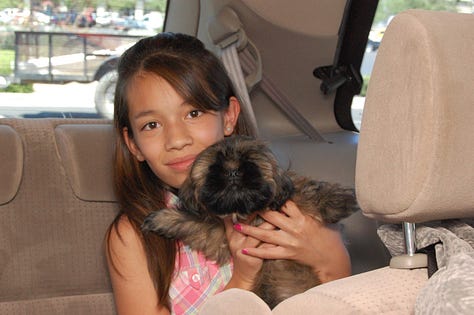


He quickly went from being her dog to the family dog, so much so that when she grew up and moved out, he stayed. Looking back over family photos over the years, he was always part of the cast of characters. He was there when our younger kids were born, he was with them when they were small, and he stuck by them as they grew.

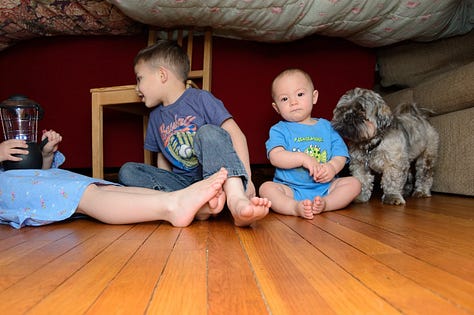

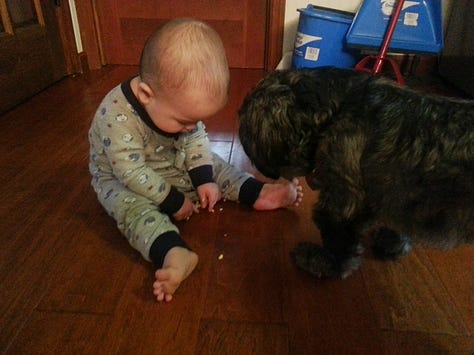
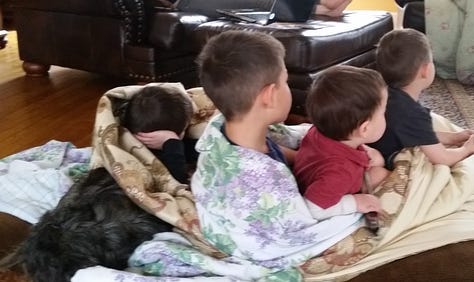

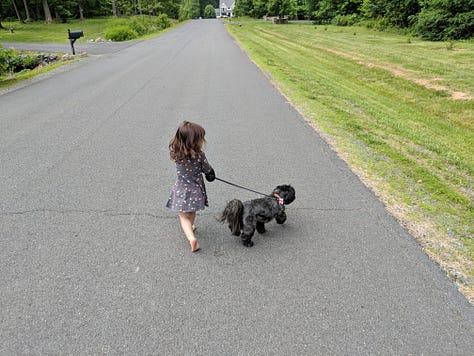
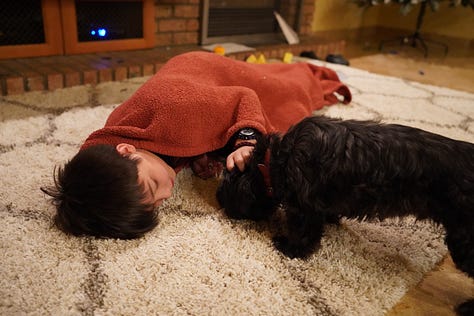

Oscar was older than half our kids, and for seven of our eight, they’ve never known a home, at least not that they can remember, without him in it.
Until, suddenly, they did.
He’d been on the decline for a while. An eye injury a couple years back turned into a case of traumatic glaucoma, leading to total blindness in his right eye. He had a heart murmur that must have been growing worse, and between that and the blindness, our little speed demon began dramatically slowing down over the past couple of years, sleeping for most of his days, losing weight, and moving more slowly and carefully everywhere he went.
And then, a couple of weeks ago, I sensed that something was seriously wrong. He had suddenly become very lethargic and disinterested. He had already stopped crying to be brought upstairs at night when we all went to bed, and just resigned himself to the living room. But one morning, after he indicated that he needed to go outside, he didn’t find a spot like usual to take care of nature’s call. Instead he shuffled over to an area of the landscaping rocks where the sun was shining and very slowly and deliberately took a seat. When I called him after a while to come in, he ignored me. I went and sat with him, and we talked, and I think we both knew that he wasn’t long for this world.
I started preparing the kids for the inevitable. I wanted them to at least try to get used to the idea.
In case you’re wondering, no, that doesn’t really work.
This past Tuesday, he started, almost completely out of the blue, to cough a lot. Then, he started to breathe harder and faster. By Tuesday night, I was concerned. His breathing was rapid and shallow, and he was restless all night. We called the vet, and they gave us an appointment first thing in the morning. We took him with us to drop off the kids at school, then made a beeline for the animal hospital and left him with them for the day.
They confirmed what we were thinking: his heart was failing, and he had fluid on the lungs because of it. It’s apparently a fairly common condition in his breed. I had a candid conversation with the veterinary tech, and she confirmed that while there was no way of knowing how long he had, it was a very uncomfortable ailment, and it was probably a good time to start thinking about putting him to sleep.
They gave him a diuretic for the fluid in his lungs and some heart medication to keep his blood pumping, and we took him home. His breathing calmed for a while, but not as much as expected. By the next morning his breathing had gotten worse again, even after another dose of medicine. He didn’t have the energy to come upstairs to my office, so after sitting with him for a while, Jamie left him in the living room to come up and work with me on some things that needed attending to, among which was finding a euthanasia option we felt comfortable with.
As if you can find a euthanasia option that you can be comfortable with.
She didn’t even feel comfortable researching it with him on her lap, which was a big part of why she came upstairs to do it. It might sound silly, but it isn’t.
Then there are the lagging doubts: Maybe the medication needs more time to work. Maybe he’ll live for another six months. How are the kids going to handle this? Conversely: What if by keeping him going we’re just making him suffer more? He seems like he’s really struggling, we need to just bite the bullet and schedule this, right?
The idea of scheduling the death of a pet that has been part of your family for more than half the time you’ve been a family is jarring. It’s not a dentist appointment, it’s the end of a life. In theory, if it’s what you need to do, it should be a somber but doable affair. But as much as we tried to approach it rationally, neither of us wanted to actually commit to a time and date.
After an hour or so of reading various websites of various services with various euphemistic, alliterative names, we identified a place that seemed affordable and sufficiently dignified. And then, Jamie remembered that Oscar had had an accident earlier because of the diuretic, and had very uncharacteristically peed on the floor. She got up and said, “I need to go check on him and see if he needs to go out.”
She went downstairs, and after a minute or two I heard her say in a concerned voice, “I can’t find him.”
My heart sank.
I got up from my desk and went down to help. She was looking in all his usual spots, but I went looking for a body. I found him, sprawled out on the kitchen floor behind the island, as though he had dropped mid-stride.
I’ve never found the dead body of anyone I knew well before. I’ve hunted and killed a few small animals, I’ve found dead ones, I’ve been to wakes and funerals for people, but I’ve never seen someone I knew, day in and day out, in that uncanny valley that sudden death creates, identifiable but unrecognizable. It was jarring. The unnatural look on his face, the pool of blood he was lying in that is, I’ve learned, a postmortem characteristic of congestive heart failure - it was disturbing. It’s an image that has replayed in my mind countless times since I discovered him there.
We both hated that he had died alone. We hadn’t left him for that long.
My feelings about all of it are odd. I’m sad, but not grief-stricken. He was a dog, not my son, and we had more of a mutual understanding more than a close bond. He had become increasingly difficult and expensive to care for, and he was no longer his usual self. I don’t think he wanted to be here anymore, especially since the onset of his glaucoma, which blinded him in one eye and looked like it may have been starting in the other.
But for my children, Oscar’s death was a heartbreaking loss. And seeing their hearts break broke mine. We took them out of school early that day, told them what had happened, and drove together to the crematorium. They had some time to say their goodbyes to their old friend, now lying cold in, of all things, an empty Amazon box, and it was crushing to watch. I can’t even write about it without tearing up again now. I’ve never seen them so sad about anything. We took them out to dinner that night to get their minds on something else. It worked, if only for a little while.
Just like when a person dies, the old habits you have in relation to them are hard to let go of. I had to stop myself more than once from making sure the gate or the front door was closed so he wouldn’t get out into the street. I expect to see him there, sitting on the top of the couch like a cat, every time I come home. He does not show up at my feet while I write, sighing occasionally. He doesn’t make little murping sounds in his sleep from his bed in my room at night. His bowls are washed and put away. His food and any useful items will be donated if we can find a recipient. When we got him, we had only four children, and our lives were quite different. With home-based businesses, seven kids at home, six of them busy with school and related activities, and one of them a very attention-hungry one-and-a-half-year old, we’re too busy to even consider another dog right now. We’ve traveled across the country a lot in the past few years, and it’s challenging enough with a big family. A dog adds logistical complications that make it that much more difficult. Jamie and I have often thought that when he finally passed on, there would be a freedom in his absence.
And there is. But there’s no joy in it.
Instead, there’s just an emptiness in our lives in the place where Oscar always was, and nothing is coming that will fill it.
That said, sometimes, I think the hardest thing about grief is how effectively we move on. My oldest two sons were in a depressed funk the morning after Oscar died, and we decided to let them stay home from school and just work through it. I don’t know if it was the right choice, but it was the one we made. I could have talked to them about being strong and continuing on in the face of difficulty. Instead, I played video games with them and got them laughing and just let them breathe.
A dog’s passing is perhaps a strange occasion for a bout of Memento Mori, but it still struck me. I found myself wondering how it’ll be when I die.
I know the people who love me will be sad. And it’ll linger longer than it does when a pet dies, but they’ll still have to move on.
They’ll still have to decide what they want for dinner the evening after I leave them. Will they debate, like we did, about whether to do pizza or Asian food?
They’ll still have to go to back to school, and take history tests, and come home and do chores. They’ll still play video games, and watch movies, and read books. They’ll still need to laugh, and love, and get on with living. They’ll still need life to go back to something like normal sooner rather than later, because who can live forever in a state of grief?
When someone you love dies, sometimes the fact that you can move on is the hardest part. It feels like you shouldn’t, but you can, and you do.
Because life goes on, right up until it doesn’t.



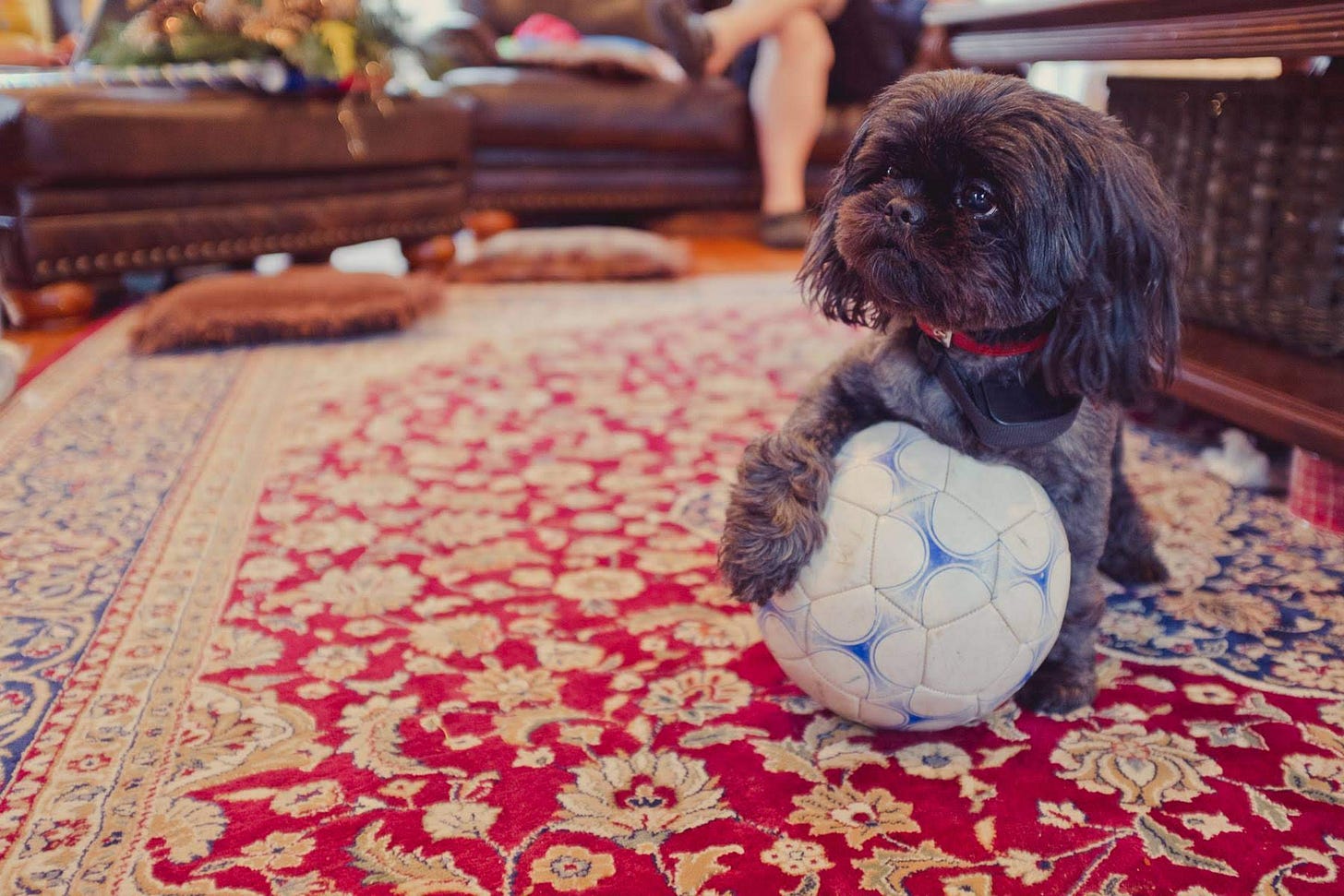
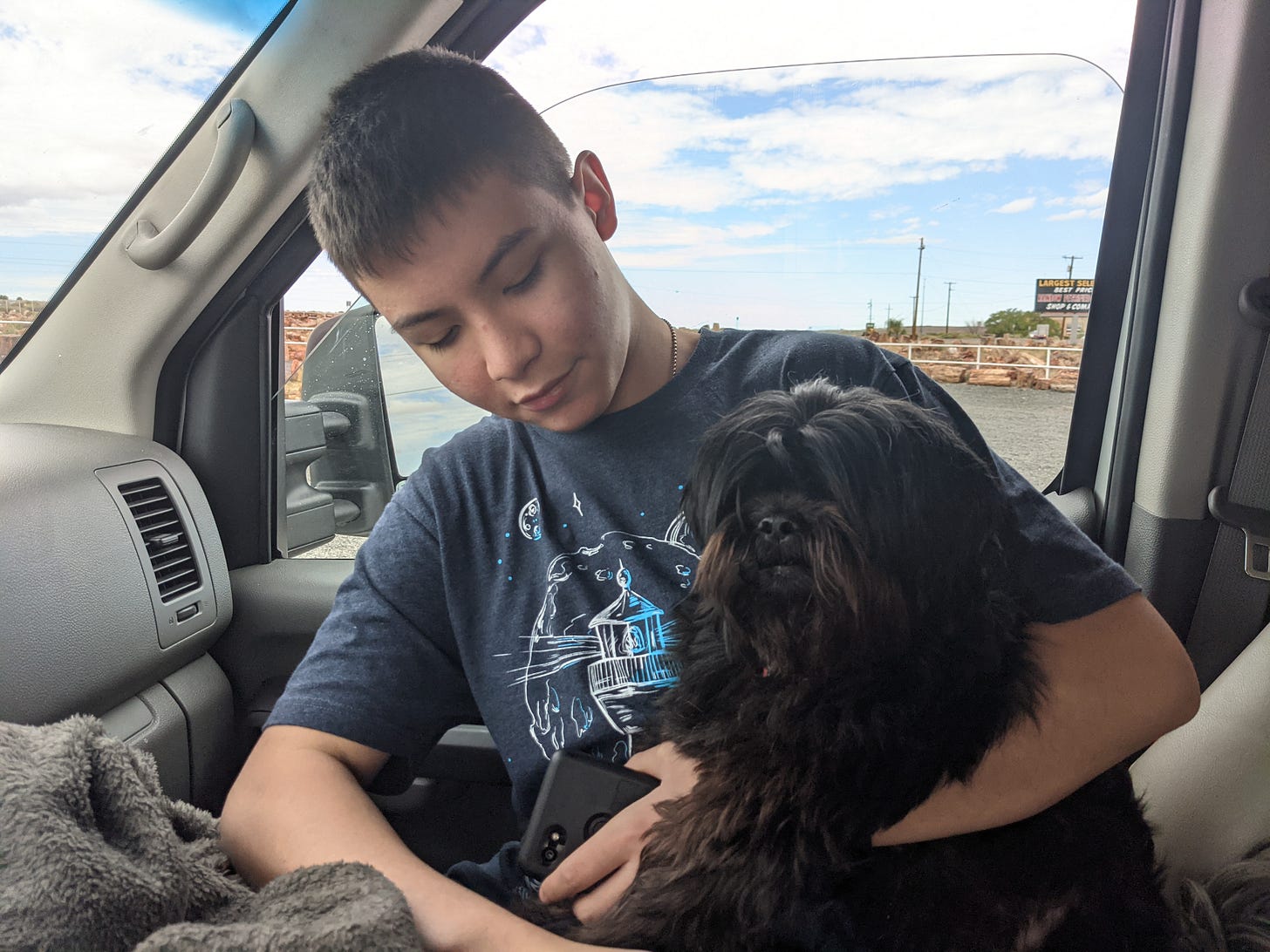

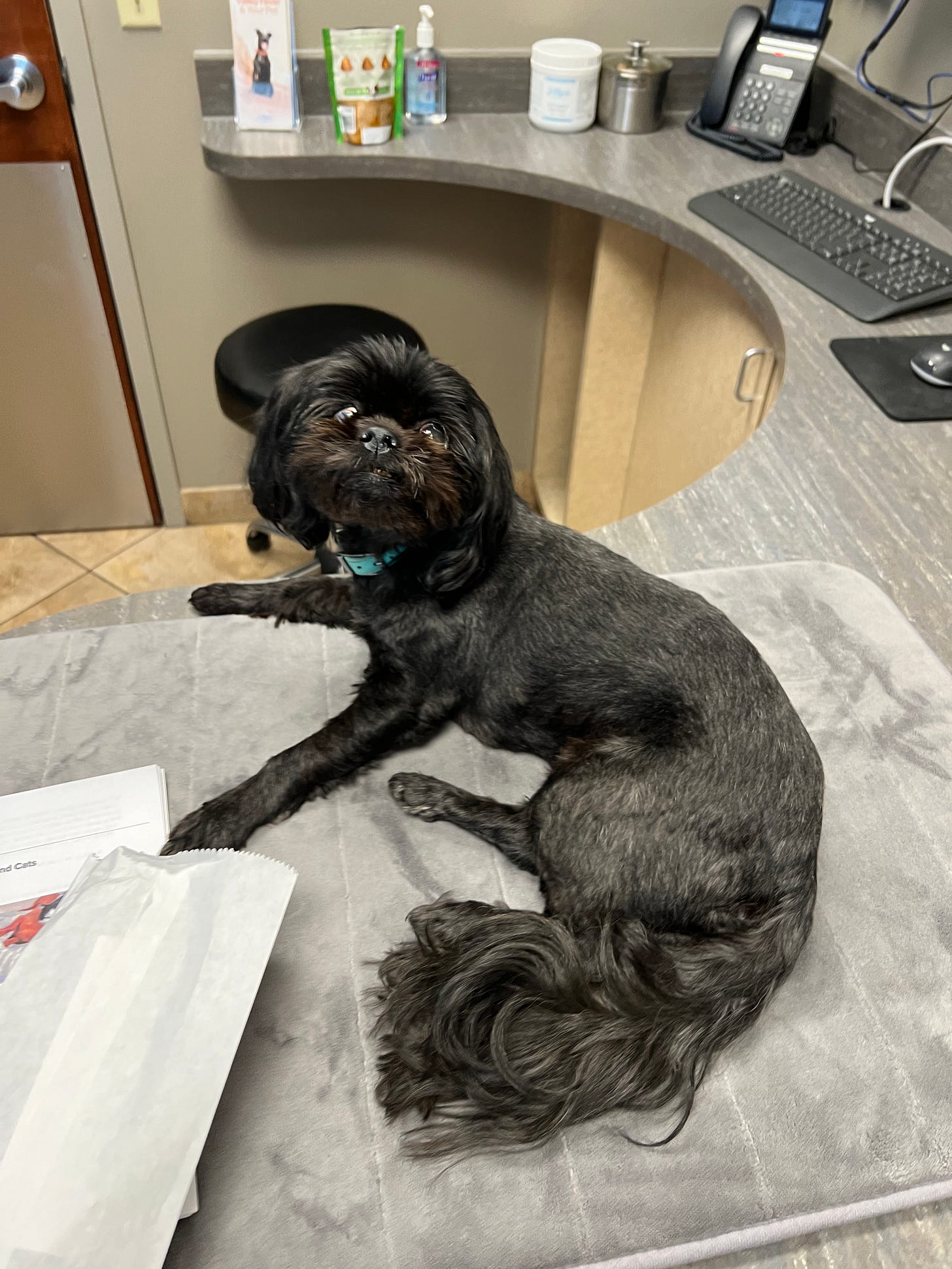

Love you, bro.
F*$# you & God bless
Fjk and Marius the dog
Beautiful meditation. I agree that one of the hardest things about grief is that we get over it and move on. It can seem like a betrayal of the deceased. On the other hand, if we truly loved the person, or pet, do we really ever get over their death? We learn to cope, to smile again and to get on with our lives, but doesn't some corner of our heart continue to ache for them? My dad has been dead for 36 years and my mom for 5, I still think about them everyday. I continue to recall good times with friends who are now deceased and smile whenever I think of our pet dog Shaker who's been gone for decades.
Saint Isaac the Syrian wrote that if we are filled with God's love then we care about every human being, the birds and beast and "even" the reptiles. Indeed, he thought we would have charity for the demons. Saint Isaac saw this as an ideal for the human heart. Maybe you're closer than you think.
"Many who God has the Church does not have, and many who the Church has God does not have."